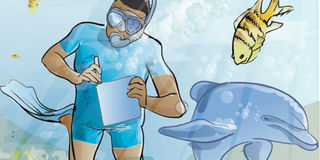Learning to secure Africa’s unique ecology

ILLUSTRATION | JOSEPH NGARI One thing that stands out in Africa is the flora, fauna, and ecology.
What you need to know:
- There is a need people who specialise in ecology, wildlife management, environmental science, zoology, costal conservation, and marine and freshwater biology.
- An ecotoxicologist studies the effects of chemicals, pollution, or other stresses on plants and animals. Their research contributes towards the setting of standards to protect the environment.
- Environmental educators teach about nature, new discoveries, and ecological problems.
What makes Africa so different from the rest of the world? One thing that stands out is the flora, fauna, and ecology. It is so different here, compared to the rest of the world – so fragile and unique.
With a growing population that puts pressure on the environment, how do we ensure that this uniqueness will exist forever?
There is a need people who specialise in ecology, wildlife management, environmental science, zoology, costal conservation, and marine and freshwater biology.
These people can help manage our unique environment better by ensuring that decisions concerning these issues are made based on data, information, and experience, and not haphazardly.
An overview of conservation can be combined with ecology. Ecology is all about the connection between living things and their environment. A good ecology can be sustained through a variety of disciplines.
For example, an ecotoxicologist studies the effects of chemicals, pollution, or other stresses on plants and animals. Their research contributes towards the setting of standards to protect the environment.
An environmental economist interprets environmental issues into monetary value. Environmental economists can help to answer questions such as: How much is this land worth if we do not develop it?
Ecoinformatic specialists use technology, including computer software, to manage the vast amounts of data gathered from scientific observations. They are able to develop programmes to help scientists to better manage and analyse their data.
Environmental educators teach about nature, new discoveries, and ecological problems.
Environmental lawyers concentrate on legal issues and problems concerning the environment. They could help to find a compromise between a land developer and the environment.
Many of the above careers can be office or laboratory based. What about someone who wants to be in the field?
Areas such as wildlife management can be even more hands-on. It is partly about the safeguarding, maintenance, and control of wildlife, but more on how a balance can be reached between species, the environment, and the pressures of modern life.
No longer can animals roam as freely as they used to. The populations of species need to be controlled.
The career is about learning wildlife habitats and how they are changing or being moved, their food supplies and how to grow and distribute these, as well as controlling predators or the spread of disease.
Culling and reintroduction of species can be effectively used to control wildlife numbers. It is important to understand the dynamics behind these decisions, as it will have a long-term impact on the ecology around you.
Wildlife is not only limited to the land. We have a long coastline that is fragile, and its management needs to be ensured so that long-term fish populations are sustained.
At the same time, the ecological environment is so delicate that the reefs need to be protected and managed and the river systems that feed the ocean must be clean and silt-free.
With a growing population that has an insatiable appetite for protein, wild fish stocks are dwindling. Fisheries management or aquaculture can help to manage these stocks, while at the same time allowing the farming of fish in an environmentally sustainable way.
In high school, it would be wise to take some science subjects, such as biology and chemistry. Maths and English are vital. Other subjects that are helpful include geography, computing, and languages.
To gain a better understanding of the environment, joining the school’s wildlife club, scouts or girl guides, and being involved in outdoor activities would help.
The writer is a director at the International Education Centre, Nairobi




